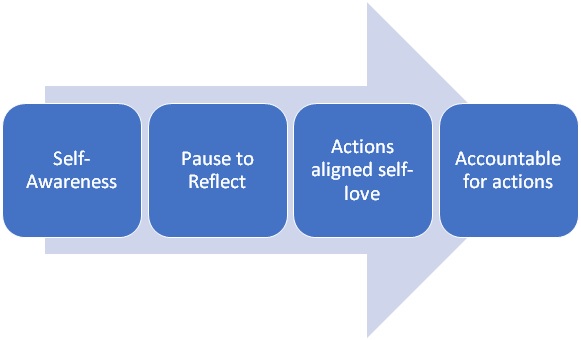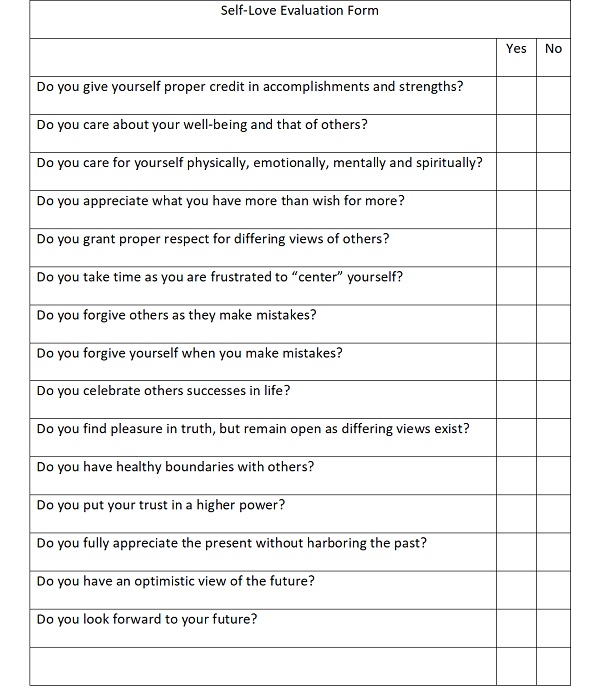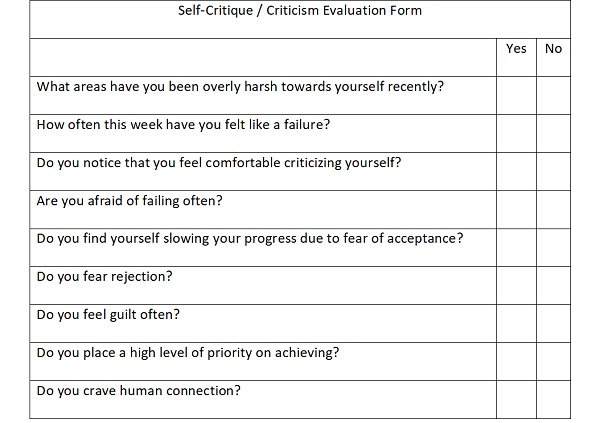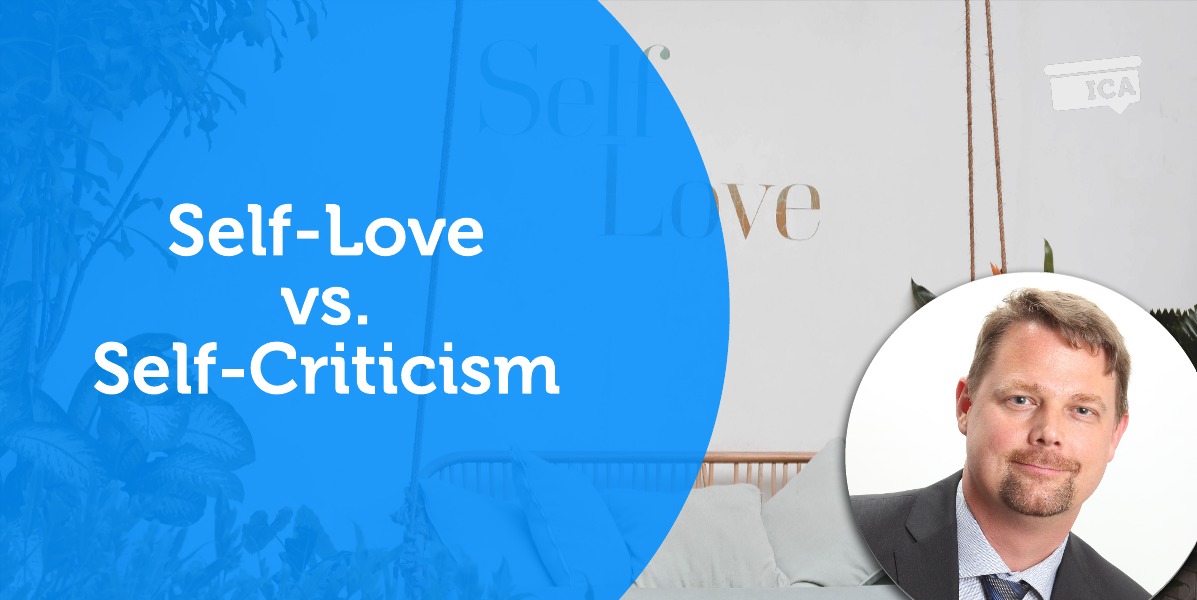A Coaching Power Tool Created by Donnie Wells
(Transition Coach & Leadership Coach, UNITED STATES)
A daily focus that can bring about success

This power tool will explore our ability to choose self-love versus self-critique. Fully learning and appreciating these concepts is paramount to the self-awareness journey. When a person knows when they are choosing to love themselves fully or, on the other hand, knows when they are being harshly self-critical, then they can capture better control of themselves. Once a person has full control of their thoughts, they can begin the challenging work to control subsequent feelings, emotions, and behaviors. This journey of self-awareness is a worthwhile one that can result in a person being a better worker, spouse, parent, sibling, and child.
Let’s first explore one source within ourselves that can provide early indications of whether or not we are loving ourselves or being too self-critical. An example of a conversation we may have in our heads goes something like this:
Shoot, I can’t remember her name. What is her name? Darn, here she comes. What is it….Sally…. Sue? She just told me yesterday. What’s the matter with me? This is going to be embarrassing. (Singer, p. 7)
Michael Singer provides this example to illustrate an “inner voice”. After becoming aware of our “inner critic or inner voice” (Singer, p.7) we can fall prey to the message it speaks or we can simply choose to learn from it and let any subsequent judgment fall away. “If you’re smart, you’ll take the time to step back, examine the voice, and get to know it better.” (Singer, p. 7). “The cure for judgment is self- love.” (ICA p. 4).As it turns out, listening to our inner voice and observing our judgments can give a glimpse into our “self-love account balance”. Another way to phrase this would be “the more I am judging myself and those around me, the more time I need to focus energy on self-care and self-love”. Why is loving ourselves so critical anyway? The Holy Bible includes a verse that aligns with this notion and it is located in Matthew 22:37-39: 37 Jesus replied: “‘Love the Lord your God with all your heart and with all your soul and with all your mind.’38 This is the first and greatest commandment. 39 And the second is like it: ‘Love your neighbor as yourself.’ Once coaches help clients enhance their capacity to love themselves, then harsh self-judgment begins to wane as does the judgment of others. The development of self-love and self-care discipline is paramount as clients strive to grow and become better versions of themselves through the coaching process.
So, what is self-love anyway? How can a client grow their capacity to love themselves more fully? What is the relation between our inner voice and choosing to apply self-love and/or self-criticism? A close examination of “self” and “love” follows below.
Baumeister believes the human self is defined, first, by its ability to turn inward and engage in self-reflection; second, by its identity as an interpersonal being, partner, and group member; and, third, by its executive function as an agent that makes choices, exert control, and engages in self-regulation.
As human beings take time to examine themselves it can be helpful to further break down ourselves into four categories, which are: physical, mental, emotional, and spiritual. Physical and mental aspects of human existence tend to be widely accepted. We have a physical human body and most people have the opportunity to learn new skills. Physically growing and learning happens naturally as people transition from infants to adults. The latter two elements (emotional and spiritual self) deserve more exploration given their ambiguous nature. There are many differing views on the emotional and spiritual realms. Emotional awareness is borne from a place within oneself as they become aware of their emotions and they navigate interpersonal relationships judiciously and empathetically. Emotionally aware individuals set a clear intention with how their behaviors impact on those around them. They understand the implications that they have on those around them. Regarding spiritual awareness, this power tool assumes there is a higher power(aka God, Higher Power, the Light, Shiva, Alla, etc.). As of 2020, there are 7.8 billion people on the planet and roughly 750 million people do not believe in God. (Zuckerman, p. 61). Extrapolating this math suggests that the vast majority of people believe in God. Now that a basis for “self” has been established in the four different realms, it now makes sense to transition to ways in which we can exhibit self-love.
Reflection of various ways in which humans explore themselves through the lens of self-love is important. The Holy Bible has a definition of love below from the book of 1 Corinthians chapter 13:
Love never gives up. Love cares more for others than for self. Love doesn’t want what it doesn’t have. Love doesn’t strut, Doesn’t have a swelled head, Doesn’t force itself on others, Isn’t always “me first,” Doesn’t fly off the handle, Doesn’t keep score of the sins of others, Doesn’t revel when others grovel, Takes pleasure in the flowering of truth, Puts up with anything, Trusts God always Always looks for the best, Never looks back, But keeps going to the end. (Holy Bible. The Message)
Apply the concept of “self” and “love” can provide a general checklist below to help clients determine if they are demonstrating self-love.

The evaluation form suggested above is not meant to be perfect, but it intended to provide clients with a general checklist of topics that can help them evaluate their capacity to love themselves.
Let’s now explore the concept of self-critique oftentimes labeled as self-criticism. According to Allison Kelly Ph.D., self-criticism can be defined as:
“The tendency to evaluate oneself harshly. Self-critical individuals are always scrutinizing themselves and their performance in most areas of their life. Self-criticism is a personality trait, which means that some people tend to be very hard on themselves whereas others are less so. Self-critical individuals are deeply afraid of failure and rejection, feel a lot of guilt, and prioritize achievement over the social connection; they have a hard time forming close relationships.”
Summarizing this definition can be narrowed to being excessive in judging ourselves. Following the earlier checklist model, how can we guide clients into an awareness of unhealthy amounts of self-critique?

Again, the evaluation form suggested above is not meant to be perfect, but it intended to provide clients with a general checklist of topics that can help them evaluate their tendencies to become overly self-critical.
As we help clients build self-awareness around negative self-talk otherwise known as self-criticism, they can begin to shift their perspective. Surely if one can intentionally choose to be self-critical, they can also choose to have better self-care determination. Ultimately, the decision to consciously choose to have a daily determination around self-care must come from a client’s will. Some may argue that a person’s will is heavily influenced by others and the life circumstances surrounding them. This is not disputed by this body of work, but it is important to note that highly self-aware and self-motivated individuals have been able to overcome circumstances beyond their control as they choose to exert their will moving forward. In “Man’s Search For Meaning” by Viktor Frankl, the author describes his time “describing his personal experience as a prisoner in Nazi concentration camps during World War II, and describing his self-administered psychotherapeutic method, which involved identifying a purpose in life to feel positive about, and then immersively imagining that outcome.” (Wikipedia, 2020) Frankl outlines a basic belief that human beings have the full capacity to choose their life purpose, define why it brings motivation and how that cannot be influenced by any external factors. This “self-will” is fully controlled by clients. The ability to develop life purpose with the daily discipline to focus on what can be fully controlled and self-applied such that a new daily awareness can be generated with intent.
Clients that become aware that they are influenced by their inner voice are close to adjusting their mindset. A key to this approach of adjustment is to become acutely aware of the moment one begins to have self-critique. They become aware in the moment that negative self-talk is happening and they immediately activate mental triggers that might look like this:
Awareness
-
- “I am encountering a circumstance that is creating negative feelings towards myself or others.”
- “I am being heavily influenced by my inner voice.”
Pause
-
- “I will sit within my thoughts and observe them,
- “I will not become a victim of my inner critic and negative self-talk’.
Action
-
- “I will orient myself into a more loving approach in mind.”
- “I will trigger a response to administer “self-care” that is aligned with my will and life purpose”.
- “I will engage with the circumstance.”
Accountable
-
- The client holds themselves accountable for inner thoughts and outer actions keeping aligned with their deeper purpose and intention for life.
Everything can be taken from a man but one thing: the last of the human freedoms—to choose one’s attitude in any given set of circumstances, to choose one’s own way.(Frankl, p. 77)
In summary, the four-step process above: Awareness, Pause, Action, and Accountable will help a client see the benefits of excessive self-critique. As they become aware that their inner dialogue is being too harsh, they will take time to reflect on a reality that they need to stop and step into self-care. Each client will administer self-love differently, but as this happens in abundance, they will learn to shift their mindset. They will learn to listen to their self-critique as a way to trigger them into slowing down life and take time out to love themselves. In this approach, self-critique will become normal and healthy because the clients will approach their lives with the awareness that aligns with their uniqueness and purpose.
Bibliography & Works Cited
Michael Singer. “Untethered Soul. The Journey Beyond Yourself.” New Harbinger Publications, Inc. Noetic Books, Institute of Noetic Sciences. 2007. Print
International Coach Academy (ICA). “Releasing Judgement”. 2019 www.archive.coachcampus.com.
The Holy Bible: New International Version. Zondervan, 1984.
The Holy Bible: The Message. Translation of the Bible by Eugene H. Peterson. 2002.
Sarah L. Schroeder. “The Remarkable Human Self”. https://www.psychologicalscience.org/observer/the-remarkable-human-self
Zuckerman, Phil (2006). “3 – Atheism: Contemporary Numbers and Patterns”. In Martin, Michael (ed.). The Cambridge Companion to Atheism. p. 61. DOI:10.1017/CCOL0521842700.004. ISBN 9781139001182. Between 500 million and 750 million humans currently do not believe in God.
Allison Kelly Ph.D., C.Psych. “Are You Self-Critical?” Posted May 29, 2019https://www.psychologytoday.com/us/blog/all-about-attitude/201905/are-you-self-critical
Frankl, Viktor E. “Man’s Search for Meaning”, Beacon Press, 2006. Print
Wikipedia.
International Coach Academy (ICA). Coaching Presence Module. “Releasing Judgment”. 2019
